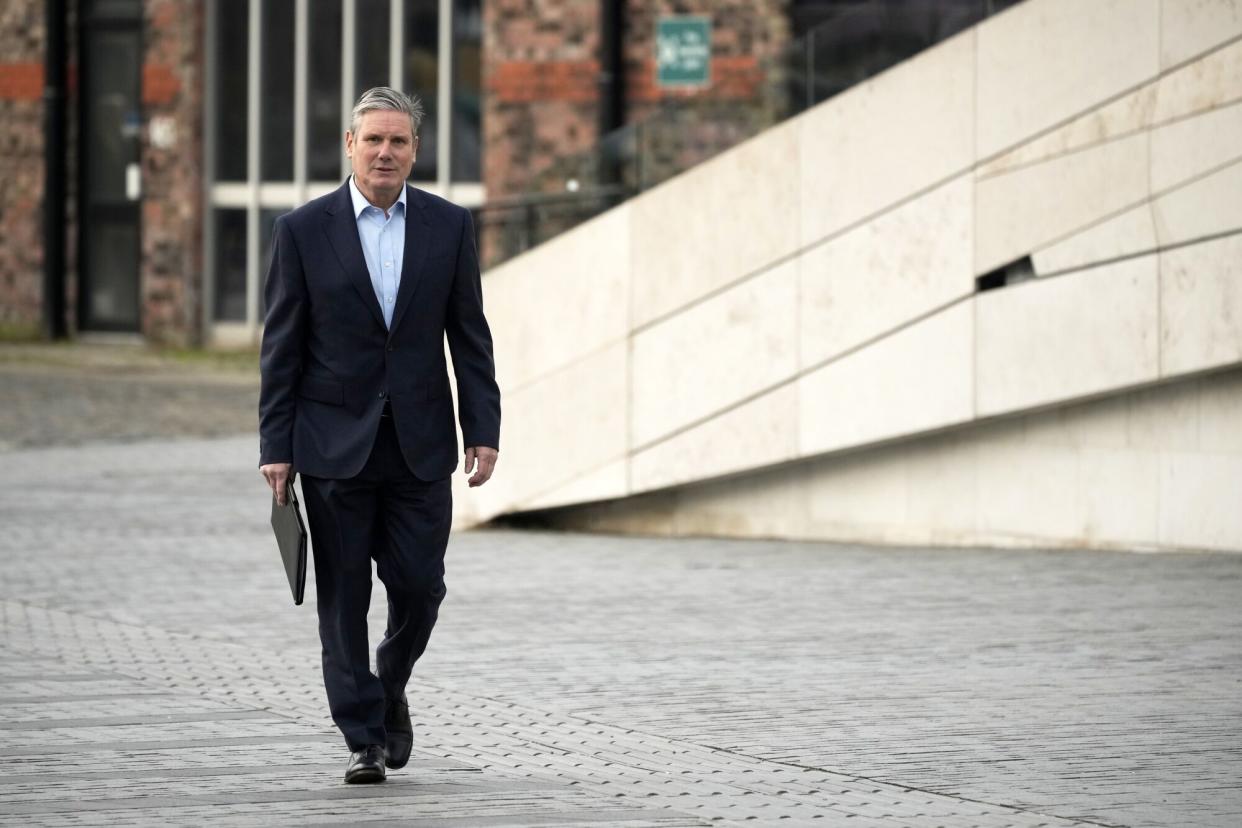UK’s Starmer Says He’s ‘Bang on Schedule’ to Win Power

(Bloomberg) -- UK Labour leader Keir Starmer said his party is on track to return to power at the next election, as he deflected concerns that voters are still unclear about what he stands for.
Most Read from Bloomberg
Israel Latest: Army Stops Lebanon Incursion, Calls Up 300,000
Oil Surges as Israel Conflict Reignites Middle East Volatility
“We’re bang on schedule,” Starmer told BBC’s Sunday with Laura Kuenssberg, at the start of Labour’s annual conference in Liverpool. The aim of this week’s gathering is to “weld together the reassurance people need with the hope that they want,” he said.
Buttressed by polling giving his party a double-digit lead over Prime Minister Rishi Sunak’s governing Conservatives for the past year, Starmer is increasingly portraying Labour as a government-in-waiting. That’s something that was almost unthinkable in 2019 when the party sank to its worst electoral defeat since before World War II.
Read More: Starmer’s UK Vote Challenge Can Be Summed Up in a Number: 123
Still, he was shown a word cloud gathered from focus groups conducted by research group More in Common that demonstrated the challenge ahead: “Nothing,” “don’t know” and “not sure” were some of the most popular terms associated with Starmer, compared with “rich” and “money” for Sunak last week.
Conceding he still had work to do to get his message across, Starmer said his job was to move on “from the worst general election loss since 1935” to get to “a Labour Party that can win the next general election.”
That had required him to “change the party at speed and ruthlessly,” he said. Economic growth would be the “single defining mission” of his party if he won power, he added, insisting that Britain would see higher growth “very quickly” under a Labour government.
In the BBC interview, Starmer also vowed:
To build 1.5 million new houses over five years and boost social housing, saying the dream of home ownership had been “completely shattered” by Sunak’s government.
To get National Health Service staff to work overtime to provide an extra 2 million operations, scans, and appointments in the first year of a Labour government.
To reverse the Conservatives’ plan to send asylum seekers to Rwanda, saying it was the “wrong policy” and “hugely expensive.”
Starmer said he was “confident” he could secure enough economic growth to pay for investment in public services, warning that businesses were currently “holding off for investment” due to a lack of stability.
“This is the central mission of an incoming Labour government,” Starmer said. “Everything else hangs off that.”
The Labour leader repeatedly insisted he was a “pragmatist,” amid warnings from within his party that he is not being bold enough with his policies.
Sharon Graham, general secretary of the Unite trade union — a major donor to Labour — told Sky News that the party had been “too timid” and risked “limping into Number 10.”
Starmer’s strategy has been to rebuild and reform Labour to make it ready for government after the leadership of his left-wing predecessor Jeremy Corbyn. Both Corbyn and his MP ally Diane Abbott have since been suspended from the party — Corbyn for comments he made about antisemitism and Abbott for a letter she wrote to a newspaper about racism.
Starmer has ditched many of the left-wing policies he himself promised in the 2020 leadership contest, and he and shadow chancellor Rachel Reeves have concentrated on wooing big business and former Conservative voters in order to try to broaden the party’s appeal.
“I think everyone in London who wears a tie has had breakfast with Rachel Reeves,” Currys Plc Chief Executive Officer Alex Baldock told the same BBC show.
(Updates with quotes and context starting in seventh paragraph.)
Most Read from Bloomberg Businessweek
Worst US Bond Selloff Since 1787 Marks End of Free-Money Era
Despite Backlash, Companies Still Benefit From Being Pro-LGBTQ
With Banks Offering 5% Returns, Financial Advisers Fight Irrelevance
Tech IPOs Could Burn Firms Who Bought Into Hot Startups Too Late
©2023 Bloomberg L.P.



